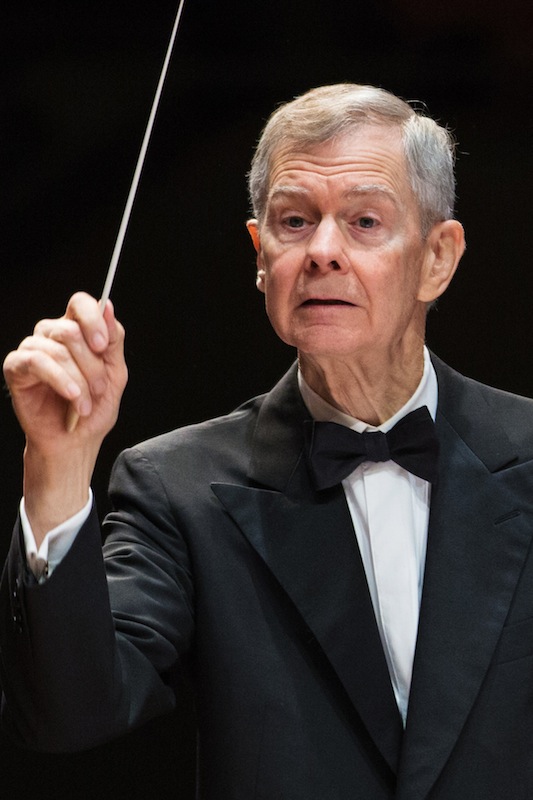New England Philharmonic marks four decades with Tippett’s “Child of Our TIme”

Richard Pittman conducted the New England Philharmonic Saturday night at the Tsai Performance Center.
Works that lie well off the beaten path for most ensembles make up a sizable portion of the New England Philharmonic’s seasonal offerings. Recent seasons have witnessed performances of Britten’s Spring Symphony and Roy Harris’ Symphony No. 3, among other little-played works.
That tradition continued Saturday night at the Tsai Performance Center where Pittman and the NEP rang in their 40th anniversary with works by Gunther Schuller, Richard Cornell, and Michael Tippett.
Tippett’s A Child of Our Time, which made up the bulk of Saturday’s concert, is a fixture in musical history for its theme of social justice. Like Benjamin Britten, Tippett was an avowed pacifist, but he was not blind to global issues. He crafted this oratorio between 1939 and 1941 during a time of political upheaval in Germany.
The eponymous child at the heart of this secular oratorio was in fact a real person. After the Nazis expelled Polish Jews, a young refugee named Herschel Grynszpan grew frustrated with the suffering his family experienced in border camps. Angry for justice, he entered the German Embassy in Paris and shot the Third Secretary Ernst vom Rath. In retaliation, the Nazis orchestrated pogroms of destruction and looting against Jews still living in Germany. The event is remembered today as Kristallnacht.
Tippett’s score places Herschel’s story within a global context, laying blame at the feet of overreacting crowds who treat other humans inhumanely. There’s a firm sense of stoicism in the work. Those who suffer as Herschel and his family did seem doomed to do so, and only time can heal the wounds of a refugee. As for the mobs, the work’s conclusion offers a Jungian appeal to hope, which can only be achieved if humankind can reconcile both the dark and light sides of the soul.
Tippett’s music is cast in thirty short movements that recall the sacred works of Charles Stanford and Hubert Parry as well as more familiar pieces by Handel and Bach. It spins a secular story into a sacred tale of injustice and inhumanity, much like William Grant Still’s And They Lynched Him on a Tree. Tippett chose African-American spirituals for his oratorio because he viewed them, as Still did, as potent musical sources of suffering under oppression.
Yet with such a heavy subject, A Child of Our Time never comes off as preachy. Its recurring theme of injustice is a curse of history, and for that reason the work remains, sadly, eternally contemporary.
Under Pittman’s guide the New England Philharmonic gave a reading that found the penetrating spirit of the oratorio. The opening took time to get off the ground and there were moments of imprecision. Cellos wavered in pitch in their earthy phrases and a few early entrances and tenuous attacks marred the sparse texture. But after a few minutes, the musicians settled in and delivered playing of rapt intensity.
The soloists were excellent. As the title child, tenor Charles Blandy sang with bright, piercing phrases in his arias. In the spiritual “Steal Away” his voice swelled with conviction.
Soprano Sarah Pelletier was the child’s mother. With a cavernous voice and powerful presence, she found the poignant sorrow of the character. Her cries of anguish in “How can I cherish my man is such days” took her to ringing high notes, which soared over the orchestra. Her voice in the spiritual “Go down, Moses” added a surging intensity to the choral parts.
Mezzo-soprano Krista River sang warmly in her solo moments, which supplied much of the work’s narration. “The soul of man is impassioned like a woman” was richly lyrical. Bass Sumner Thompson had an early entrance in “Go down, Moses.” But aside from that slip his bright, smooth-toned voice found the biblical warning of the harrowing story.
The heroes of this performance were the members of Chorus pro Musica. Prepared by Jamie Kirsch, the singers performed with clear diction and vitality, especially in the spirituals. The only weaknesses were in the crowd scenes, and the chorus, with its light tone and soft attacks, couldn’t quite muster the anger of the bloodthirsty mob.
Filling out the first half of the concert were works by Richard Cornell and Gunther Schuller.
Schuller’s Vertige d’Eros was written in 1945, one year after Tippett’s A Child of Our Time made its premiere. Yet Schuller’s piece couldn’t be more different. Named after a painting by Chilean artist Roberto Matta Echaurren, the piece brims with color. Strings and harp supply a pulse while solo winds curl seductive phrases around each other. Brasses peal from the dark Schoenbergian depths supplied by cellos, low winds, and thumping basses.
In Saturday’s performance, the NEP sounded as good as it ever has. Pittman conjured powerful climaxes from the ensemble when the piece called for them, and the duets between winds and offstage trumpet were handled sensitively. Concertmaster Danielle Maddon floated a silvery line in her brief solo spotlight.
The opener, Richard Cornell’s Melospiza melodia, was a five-minute fanfare that took birdsong as its source material. The composer fragmented and elongated the birdsongs by transforming the sounds into bursting brass figures. The strings, all the while, supply sheets of dark sonorities that hang like a black curtain. Pittman and the NEP gave bold advocacy to the work through playing of commitment and concentration.
Richard Pittman will lead the New England Philharmonic in works by Child, Copland, Currier, Kodaly, Ugay and Rakowski 8 p.m. April 29 at the Tsai Performance Center. nephilharmonic.org
Posted in Performances